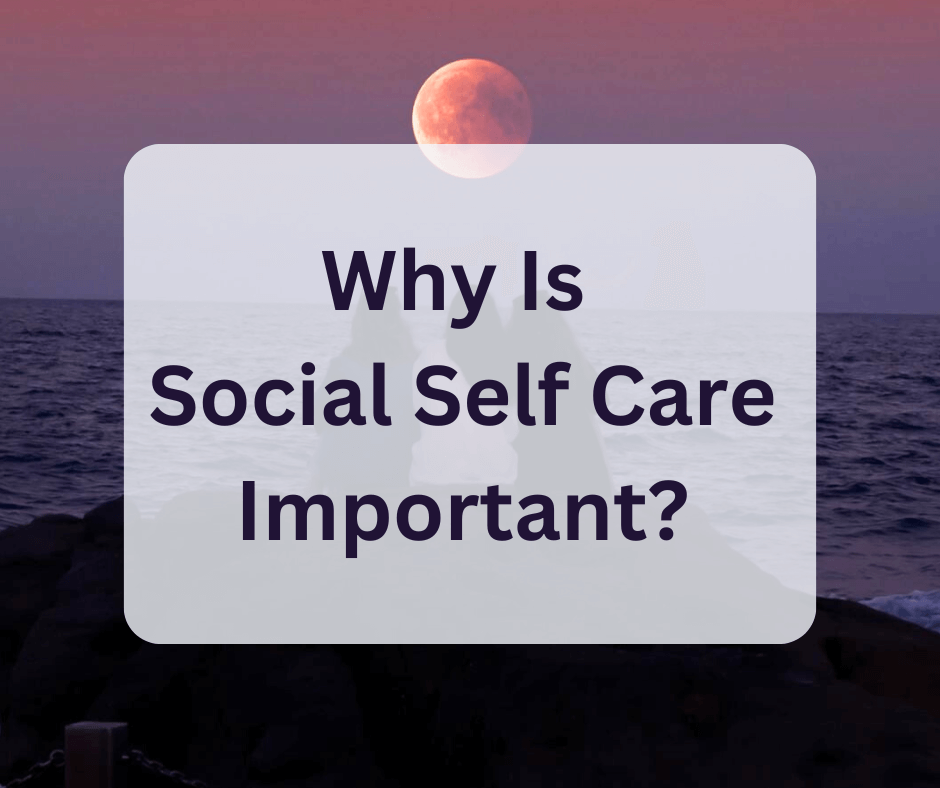Did you know that people with strong social connections have a 50% higher chance of living longer than those with weaker social bonds? In today’s fast-paced digital world, we often overlook one of the most crucial aspects of our well-being – social self care.

From the warmth of a friend’s smile to the comfort of a meaningful conversation, our social connections shape not just our happiness, but our very survival. Let’s explore why social self care is important, and why prioritising your social well-being might be the missing piece in your self-care routine!
Why Is Social Self Care Important?
Social self care is the practice of actively and intentionally nurturing interpersonal relationships. Its role in our overall wellness is paramount. Social interaction and a feeling of belonging to a community are essential for our emotional well-being.
Social connection is directly responsible for influencing our brain chemistry. Positive social interaction releases feel-good hormones, reduces anxiety and helps regulate our nervous system.
Studies have shown that people who have strong ties to their communities and fulfilling relationships have an increased survival likelihood by 50%.
This effect is comparable to quitting smoking and exceeds many well-known risk factors for mortality.
This makes sense from an evolutionary standpoint: we used to live in tribes, relying on the people around us for safety. As pretty defenseless primates, we found our strength in numbers. Being part of a larger group would ensure that we could defend ourselves against natural predators, and we could work together to build shelter and gather resources.
Under these conditions, isolation would have been a threat to survival. Not being part of a social support network would feel unsafe, it increase feelings of anxiety. We evolved to rely on each other, and these instincts have not going to away. Our bodies are wired to thrive in communities.
The Science Behind Social Connections
When discussing why is social self care important, we have to start with the science behind social connections. Let’s deep dive into how social support networks influence resilience and coping mechanisms.
When we engage in positive social interactions, several fascinating changes occur in our brain:
1. Neurotransmitter Release
- Oxytocin (often called the “bonding hormone”) is released during positive social interactions. It promotes trust, empathy, and attachment while reducing anxiety
- Dopamine levels increase, creating feelings of pleasure and reward that motivate us to seek out more social connections
- Serotonin production is boosted, helping to regulate mood and contributing to feelings of happiness and contentment
2. Brain Structure Changes
- Regular positive social interactions can actually strengthen neural pathways in areas related to empathy and social cognition
- The prefrontal cortex, which handles emotional regulation and decision-making, shows enhanced activity
- The amygdala (our emotional processing center) becomes better regulated, helping us manage stress and emotional responses

3. Stress Response Modification
- Social support reduces activity in the hypothalamus, which controls stress responses
- This leads to lower cortisol levels (the primary stress hormone)
- The presence of supportive others can actually dampen our neural response to threatening situations
4. Memory and Learning Benefits
- Social interactions stimulate the hippocampus, enhancing memory formation and recall
- Learning in social contexts often leads to better retention and understanding
- Social engagement helps maintain cognitive flexibility and can protect against cognitive decline
5. Pain Processing
- Positive social connections can activate the brain’s natural pain-suppressing mechanisms
- The presence of loved ones can reduce activity in pain-processing regions of the brain
- This explains why social support can help people cope better with physical pain
Signs You Need More Social Self Care
Feeling lonely now and then is normal, our feelings tend to fluctuate and respond to the events in our lives. But if this a constant feeling in your life, you need to introduce some social self care practices in your routines. Please don’t overlook it, this is serious.
A 2018 study found that social isolation is associated with:
- 29% increased risk of depression
- 32% increased risk of anxiety disorders
- 26% increased risk of suicidal ideation
- Cognitive decline equivalent to 8 years of aging
No need to panic if your social circle isn’t that extended. The quality of the relationships is more important than quantity. So it’s better to focus on strengthening the relationships you already have and create meaningful connections, rather than become a social butterfly.

It’s also a good idea to focus on real life connections, instead of the digital ones. Relationships are strongest when interactions are face-to-face.
Benefits of Prioritising Social Self Care
So why is social self care important, and why should you go out of your way to prioritise it?
First, strong social connections enhance emotional resilience. If you have friends you feel safe to share your problems with, it will help lighten the burden. Processing your issues out loud helps with emotional regulation. Doing so in the company of someone you trust enhances the feeling of safety. It also helps to have an emotional support system while facing difficult times.
Having a strong social support network can also contribute to achieving your personal and professional goals.
When you feel surrounded with people you trust, you are less likely to live in fight-or-flight mode, or to be overwhelmed by stress. The knowledge that you have the support of your loved ones can help overcome hurdles with ease, and come up with faster and better solutions to your problems.
Having and maintaining social connections has long-term health benefits. Social support reduces depression and anxiety symptoms. In fact, people with strong social networks (no, not the digital ones!) have a 75% lower risk of developing clinical depression. I’d say that’s a pretty strong incentive to start prioritising social self care right now.
Practical Strategies for Social Self Care
So, where do you start your social self care practice?
Focus on building and maintaining meaningful relationships. Remember, the quality of your relationships is more important than the quantity. Invest time and attention in your friendships. Here are a few things to keep in mind:
Invest time and effort into your relationships
Meaningful relationships take time and effort. You need to schedule time to catch up with your friends, reach out and stay in touch. Book activities you can do together around common interests.
Have regular date nights with your partner. If you are the kind of person who always pushes these things back because you are too busy, it’s a good idea to block time in your calendar for these things.

Get comfortable with uncomfortable conversations
Meaningful relationships make space for uncomfortable conversations. The lack of conflict is not a sign that things are going great, on the contrary: it’s a sign that something is being overlooked or suppressed.
We are unique human beings, all different form one another, so it’s natural that our interests don’t always align. This is why it’s important to have those uncomfortable conversations. Be honest, open and understanding. This is an opportunity to communicate and strengthen your connection.
Be authentic
You can’t have a real relationship with someone if you are hiding your real self. Many of us have been conditioned to be ashamed of certain character traits or inadequacies. The social media driven world we live in teaches us that we have to display a perfect image and perform rather than be.
Unfortunately, people feel if you are not being authentic and they naturally gravitate away from you. Work on being yourself and stop trying to be perfect. After all, it’s our quirks and our uniqueness that make us interesting to others.
Give and take
Meaningful relationships are well balanced. If just one person in the relationship is putting in the effort, it can never feel rewarding. Make sure you listen as much as you speak. Make sure you reach out and come up with initiatives. Don’t rely on the other person to keep the whole thing afloat, because they will tire of it eventually.
In the same way, if the other person is not contributing to the relationship, you might want to have one of those uncomfortable conversations and understand why this is. Express your feelings and needs, and if the other person if not willing to contribute, this might not be a relationship worth your time.
Overcoming Barriers to Social Self Care
I know, we all live busy lives. Often the simple fact of surviving takes up all the time we have in a day. We have so many work and personal engagements, that it’s often difficult to squeeze in social activities into our already full schedule.
But as we’ve already discussed, looking after your social well-being is not a luxury. If you find it difficult to find time for social interactions, maybe it’s a good idea to go back to your reason: what is the motivation for wanting a better social life?
Remind yourself that you are doing this because you want to be healthy, to live longer, and you want a calmer nervous system.
While it can be difficult to add something to an already crammed schedule, ask yourself whether it’s possible to replace something that doesn’t quite serve you. For example, if you spend your evenings scrolling on your phone, could you sacrifice one of those sessions in a week and replace it with a friendly catch-up?
When you see things on these terms, you realise it’s not about just another thing you have to do, it’s about prioritising the habits and behaviours that promote health and well-being.

Conclusion
Social self care isn’t just a luxury – it’s a fundamental necessity for our well-being. By understanding its importance and implementing practical strategies, we can create a more connected, fulfilling life.
Remember, investing in your social well-being today creates a stronger, more resilient you for tomorrow.
Ready to take the first step? Start by reaching out to one person in your social circle today!

